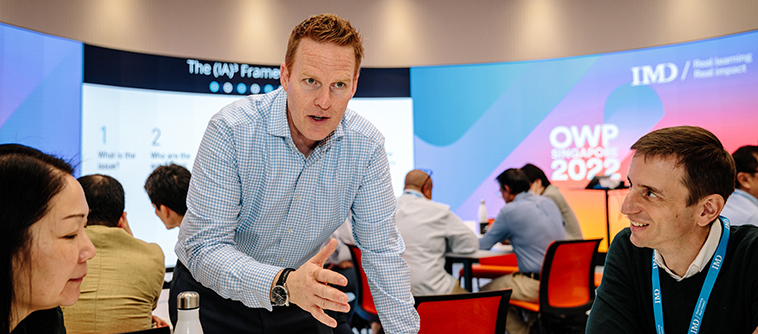On the second day of IMD’s Orchestrating Winning Performance program in Singapore, faculty and participants focused on the technology and the skills that leaders need to shape the businesses of the future.
In the morning, participants explored the latest developments in technology. In his session, “Understanding the world of NFTs”, Arturo Bris, Professor of Finance, demystified non-fungible tokens, explaining the difference between physical assets, digital assets and NFTs.
“The token economy allows companies to monetize customer loyalty and create exclusivity,” he said.
But they cannot remain solely in the digital world. “They need a presence in the physical realm too,” he said.
He highlighted companies like adidas, the largest sportswear manufacturer in Europe, and Nespresso, the Lausanne-based Nestlé-owned coffee machine and capsule retailer, both of which have found ways to use NFT technology.
“You can buy Adidas shoes in the metaverse and use them in the real world,” he explained. “It’s exclusive and it creates customer loyalty.” And the latter has released exclusive coffees for people who have access to immersive virtual worlds.
The principles of Web 3.0
Michael Wade, Professor of Innovation and Strategy, explained that the world had shifted from the first iteration of the internet – Web 1.0 – to what he called “the platform economy” and Web 2.0.
“Companies – now called platforms – offer information and services largely for free,” he said. “The implicit deal is that we get all kinds of stuff for free, but we give them our data.”
In his session, “Web 3.0 and the Metaverse: Hype vs Reality and what it means for you”, Wade argued that the next generation of the internet, dubbed Web 3.0, was governed by five principles.
First and foremost, it was about ownership and control.
“In a Web 3.0 world, you own and control your information and your identity,” he said.
Secondly, it was about tokenization because “you need some kind of a value exchange, some way to compensate different actors in a Web 3.0 universe”. His third point was to highlight the value of digital assets.
Even though there can be a problem of over-supply (“There’s no point having a non-fungible token if you have an unlimited supply,” he said), he emphasized that all assets have inherent value.
The next principle is traceability.
“Blockchain is a key part of Web 3.0 because once a transaction has been recorded, it can be accessed forever,” he said.
The final point Wade highlighted was decentralization and that Web 3.0 would no longer be governed by middlemen.
“Probably the biggest example today is decentralized finance,” he said, pointing to forms of alternative finance like crowdfunding.
In his session, “Future of work: How to lead your team in a hybrid world”, Robert Hooijberg, Professor of Organizational Behaviour, talked about the breakthroughs that had emerged out of the COVID-19 pandemic.
“If I had told you in 2019 that your company would have 100% of its employees working from home in less than two weeks, you would have wondered if I was mad,” he said.
He highlighted six ways in which the corporate response to the pandemic had improved businesses.
“The best of human behavior came out,” he said.
There was the speed of implementation; more than just the acceptance of change, it was businesses embracing change; engagement from employees; personal connections and care; leaders stepping up to the need for change; and greater trust within organizations.
“People started coming up with new ideas and new ways of doing things,” he said. “Engagement within organizations was high. People were not just doing laundry and watching Netflix.”
Threats from new players
In his session, “Nonmarket Strategy: Align external stakeholders for competitive advantage”, David Bach, IMD’s Dean of Innovation and Programs, presented case studies of German automotive manufacturer Volkswagen and San Francisco-based electric mobility business Lime to look at their non-market strategy.
“Lime’s market positioning,” he said, “is about smart, sustainable, last-mile transit in urban areas while their non-market positioning is about fostering safety and more liveable cities.”
After lunch, Howard Yu, Professor of Management and Innovation, in his session “Becoming Future-Ready: Prepare your organization for what lies ahead”, pointed out that 30 years ago, 70% of the valuation of most Fortune 500 companies rested in tangible assets with the rest made up of “intangible IP technology”. Nowadays that ratio has flipped.
But new players, like New York-based Harry’s, are using a subscription model.
“They have a very strong Instagram account and YouTube following,” he said. Because the firm started with e-commerce, it didn’t need to create a distribution channel like traditional firms.
“Brands like this are usually more purpose-driven and emphasize their sustainability claims when they communicate to the marketplace,” he said.
These new, innovative firms are not a small threat. Yu said that, over the past five years within the US, US$15bn of razor sales have moved away from traditional brands to smaller ones.



